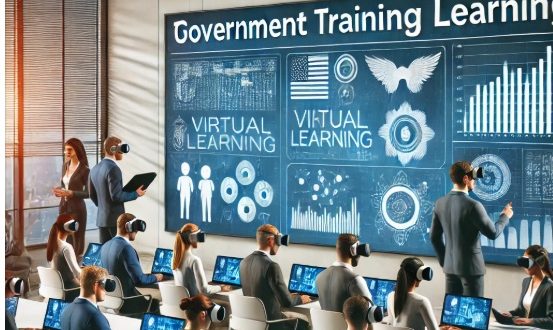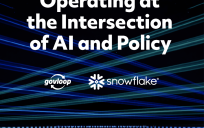Overview
The rapid adoption of artificial intelligence (AI), big data, and emerging technologies is transforming how governments operate, making workforce upskilling a critical priority. Public employees must develop skills to manage advanced systems, analyze complex datasets, and respond to cybersecurity threats. While the private sector has invested heavily in upskilling through platforms like IBM SkillsBuild and Google’s Grow with Google, the public sector has significant ground to cover to stay competitive.
Why Upskilling Matters
Upskilling isn’t just about adapting to new tools — it’s about empowering employees to:

- Harness Data Effectively: Equip employees with data literacy to analyze trends and make informed decisions that enhance citizen services.
- Strengthen Cybersecurity: Train staff to identify and mitigate cybersecurity threats, protecting critical systems from growing risks.
- Adopt Emerging Technologies: Develop competencies in AI, machine learning, and automation to increase efficiency and improve service delivery.
Challenges
Budget constraints often hinder public agencies from launching comprehensive training programs, limiting their ability to address critical skills gaps. The cost of high-quality training, and the time required for employees to upskill, pose significant barriers, particularly for smaller or underfunded agencies. Additionally, the pace of technological change adds complexity to workforce development. Agencies may struggle to identify which emerging skills — such as artificial intelligence (AI) programming, cybersecurity protocols, or advanced data analytics — will deliver the most value in the near term. This uncertainty can lead to delays in training initiatives or misallocation of resources, leaving employees unprepared to meet evolving demands. A lack of alignment between training programs and real-world applications further exacerbates these challenges, reducing the overall effectiveness of workforce development efforts.
Solutions and Advocacy
To overcome these barriers, governments can adopt a phased approach to upskilling, prioritizing high-impact areas like cybersecurity, data analytics, and digital transformation. By focusing on these critical competencies first, agencies can address immediate needs while building a foundation for broader skill development. Partnerships with academic institutions, non-profits, and technology companies play a crucial role in making training accessible and affordable. These collaborations can provide agencies with access to cutting-edge content, expert instructors, and tailored learning experiences.
Programs like Coursera for Government and LinkedIn Learning offer scalable, gamified platforms that make training more engaging and effective. These platforms allow employees to learn at their own pace, balancing professional development with daily responsibilities. Additionally, agencies can implement cohort-based learning programs, encouraging peer-to-peer interaction and collaboration to reinforce concepts.
Mentorship programs within agencies also serve as a valuable tool to bridge generational skill gaps. Experienced employees can share institutional knowledge, best practices, and insights from years of service while gaining exposure to new technologies and processes through reverse mentoring. This reciprocal exchange not only enhances technical skills but also fosters a culture of continuous learning and innovation within the agency.
Examples of Success
- State of Georgia Data Analytics Initiative:
The State of Georgia launched a comprehensive program to train public employees in data analytics, focusing on enhancing decision-making and streamlining processes across departments. This initiative leveraged partnerships with academic institutions and technology providers to deliver hands-on training, resulting in improved operational efficiency and more data-informed policymaking.
- IBM SkillsBuild Partnership:
IBM SkillsBuild has collaborated with governments worldwide to offer specialized training in AI, cybersecurity, and other emerging technologies. These programs are tailored to the unique needs of public-sector employees, providing them with practical tools and knowledge to address real-world challenges. For example, a pilot program in a European country demonstrated measurable improvements in workforce capabilities, with participants reporting increased confidence in using AI tools to improve service delivery.
- California’s Public Workforce Development Program:
California implemented a mentorship-based upskilling initiative that paired senior employees with junior staff to facilitate knowledge transfer and technical skill-building. This program not only closed skill gaps but also improved team dynamics, contributing to a more collaborative and adaptive workforce.
Call to Action
Federal, state, and local governments must allocate resources for workforce development in their 2025 budgets. Prioritizing continuous learning programs, setting clear benchmarks, and creating cross-sector partnerships will ensure employees are equipped to meet the challenges of the future.
Dr. Rhonda Farrell is a transformation advisor with decades of experience driving impactful change and strategic growth for DoD, IC, Joint, and commercial agencies and organizations. She has a robust background in digital transformation, organizational development, and process improvement, offering a unique perspective that combines technical expertise with a deep understanding of business dynamics. As a strategy and innovation leader, she aligns with CIO, CTO, CDO, CISO, and Chief of Staff initiatives to identify strategic gaps, realign missions, and re-engineer organizations. Based in Baltimore and a proud US Marine Corps veteran, she brings a disciplined, resilient, and mission-focused approach to her work, enabling organizations to pivot and innovate successfully.





Leave a Reply
You must be logged in to post a comment.